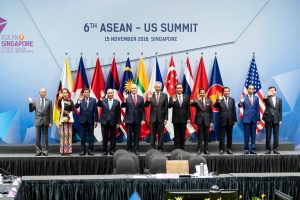Trans-Pacific View author Mercy Kuo regularly engages subject-matter experts, policy practitioners, and strategic thinkers across the globe for their diverse insights into U.S. Asia policy. This conversation with Dr. Bridget Welsh – honorary research associate at University of Nottingham Malaysia’s Asia Research Institute; senior research associate of the Hu Feng Center for East Asia Democratic Studies of the National Taiwan University and senior associate fellow of The Habibie Center; and author of numerous publications, including Regime Resilience in Malaysia and Singapore (2018) – is the 219th in “The Trans-Pacific View Insight Series.”
Identify five strategic priorities in Southeast Asia for U.S. presidential candidates to understand.
Southeast Asia is an arena for great power competition, in which Southeast Asians are not adequately respected or appreciated. U.S.-China competition has deepened this trend in recent years, as Southeast Asian countries are being asked to choose sides. This is taking place when there is a decline of U.S. power in the region, both in terms of influence among traditional allies such as Thailand and the Philippines as well as among publics. Views of the United States as a reliable ally, a democratic model, and valuable business partner are changing for the worse. The primacy of transactional politics under the Trump administration has empowered oligarchs who are not interested in creating a more competitive business environment for investment, nor promoting more democratic space for political engagement. Instead, there is increasing dependence on divisive nationalist rhetoric and identity politics.
In this context, U.S. practices and priorities need to shift.
Leaders need to show up to regional meetings, not just to show face but to reaffirm that the United States is relevant to Southeast Asia. This is not just about taking Southeast Asia for granted but appreciating that U.S. power in Southeast Asia no longer can be taken for granted. The U.S. needs to address its serious trust deficit.
Through APEC and ASEAN, the U.S. needs to reaffirm that Southeast Asian countries are not targets of trade wars, currency manipulators, or potential sanction recipients, but partners. Bullying and threats must stop. Diplomatic channels should not be sidelined, as policy should move from the erratic tweet to trusted networks. Much of engagement with Southeast Asia is about the how rather than the substance.
The core challenge for the region is promoting economic growth that is felt by Southeast Asians and does not exacerbate inequality. More robust engagement with U.S. business and Southeast Asian partners is needed to rethink how to transform services, manufacturing, and the digital economy for sustainable and inclusive growth.
Security interests need to move beyond a focus on freedom of navigation and China’s presence in the South China Sea to include climate change and human security concerns.
Human rights concerns need to be more meaningfully engaged, as overlooking killings, excusing exclusion, and ignoring repression undercut the rule of law and human dignity. There needs to be movement toward reaffirming a moral compass.
Explain how U.S.-China cooperation and competition will shape Southeast Asian countries’ hedging strategies.
Continued U.S. pressure on Southeast Asian countries will force Southeast Asian countries to choose – and they will choose the new global power and regional neighbor, China. The shifts away from the United States by Thailand and the Philippines are illustrative. Even close U.S. allies/strategic partners Singapore, Vietnam, and Indonesia are recalibrating their policies, as China is seen as more important for the economic growth and political stability of the region.
Compare and contrast Republican and Democratic strategies toward Southeast Asia.
Zero times two is still zero. There are no clearly outlined strategies by the candidates toward the region. The Trump administration has a policy framework of the Indo-Pacific, but no clear policies and effective implementation. The Democrats are not meaningfully engaging foreign policy. The focus needs to be on China, and rethinking China policy, as Southeast Asia continues to be seen in this contestation. A key step is to separate Southeast Asia from policy directed toward China and engage Southeast Asian countries through the organizations that reaffirm their regional architecture and interests, notably ASEAN.
What are the strategic stakes for Singapore, Malaysia, Indonesia, Thailand, and Vietnam in this year’s U.S. presidential election cycle?
There are three issues at stake – 1) the intensity of the confrontation with China (as this reverberates across Southeast Asia) and feeds into economic and political uncertainty; 2) the impact of the election and its likely negative combative rhetoric on the global economy; and 3) the increased pressure on countries to choose China. Southeast Asian countries are likely to have to disengage the U.S. further during the election and this will give more space for China to extend its influence.
How should U.S. presidential candidates craft strategic messaging on U.S. Asia policy generally and Southeast Asia specifically on the campaign trail?
They should start by rethinking about what their policy and priorities should be. At the core is a need to respect and appreciate Southeast Asia and to meaningfully engage with the region. Strong ties with Southeast Asia are valuable in and of themselves as the region is larger than Europe and has some of the most dynamic economies and societies in the world.

































